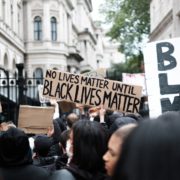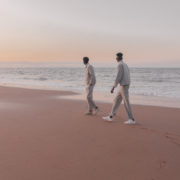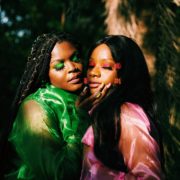Contribution: The importance of protest and collective action against racial inequality by Muna Ahmed

Every voice needs to be heard in the fight against injustice, inequality, and ignorance.
Everyone everywhere has a duty to do as much as they possibly can to ensure justice is not only served in the case of George Floyd but to ensure history does not repeat itself. Of course, to do this, deeper institutional reform (specifically, the abolishment of the police) is necessary, but protesting against the current system is a very good place to start.
Protesting isn’t just marching. We protest injustice by applying pressure for change. This can take the form of protesting against fake news by sharing real people’s accounts of the truth. Protesting against the capitalist system by attaining free property, also known as looting. Protesting against propaganda by condemning footage that is being used by the media to manipulate people’s perspectives.
Protesting against the toxicity of curfews that disproportionately affect night-shift workers, who are predominantly people of colour. Protesting against disingenuous leadership, when public figures pretend to be for the cause but are really enabling our oppressors. Protesting against the social media blackout which is presented to us as a really a tool to digitally erase our activism online. Protesting against the police system, who claims to exist to protect us when in reality it’s not us they serve. It is our duty to recognise the tools that are being used against us and defend ourselves against them.
I spoke to protestors from both the US and the UK to gather their views on the importance of protest.
Why do you protest?
“I protest because I feel that chaos is necessary to bring about order… especially when it comes to black lives because we’ve been peaceful for a long time with no obvious change. I want to do everything within my power to help the cause and feel that [protesting] is one of the easiest things you can do.”
Daquan, 21, Charlotte BLM protestor.
“Protesting is a way to reclaim a feeling of power by taking action in a system that can leave us feeling powerless.”
Aaliyah, 19, Bristol BLM protestor.
“We are fighting to be recognised as human and not be demeaned by a system that was literally created to keep us under a threshold.”
Brys, 23, Richmond BLM protestor.
What personal effect does protesting have on you?
“A positive one for sure. Being online recently hasn’t been easy… When you‘re protesting, you let out the anger you’ve been feeling. You let it out with a group of people who feel the same. You’re reminded that you are not alone. You see people from all creeds and colours and are reminded that what you are doing is bigger than you.”
Musti, 19, London BLM protestor
“For me protesting is a right of passage especially as a black person. It’s an honour because our ancestors have protested for our rights today. It also brings me closer to my blackness and my community, especially in Sheffield. I was in awe that so many people would want to protest for black lives.”
Khadija, 19, Sheffield BLM protestor.
“The protests made me realize how great my Las Vegas community is. People of all different races and backgrounds came out to protest and in total over 10,000 people came out in a span of 3 days!”
Lauren, 19, Las Vegas BLM protestor.
Do you think media coverage of the protests has been accurate?
“I think it’s been mostly accurate but obviously right-wing papers, and politicians are just making matters worse in my opinion. Like the statement, Boris released last night? Complete joke.”
Natasha, 20, London BLM protest organiser.
“Not at all! They’re more concerned with people not social distancing than the fight against racism.”
Musti, 19, London BLM protestor.
Do you think the media’s portrayal of the Black Lives Matter movement has been helpful or harmful to the cause?
“Definitely more harmful. The media do not understand the BLM movement. If they did, then they’d stand with us against the racism that is ingrained into our society/culture. That being said, by them not understanding the movement, they are misinforming the public, making it look like a group of “angry black people” causing thoughtless disruption in the streets – which plays directly against the movement, as we are trying to dismantle these old-age stereotypes.”
Musti, 19, London BLM protestor.
How does it make you feel seeing protests for Black Lives Matter around the world?
“It makes me extremely proud. Seeing the world stand together to amplify our voices makes me sure that change is near. We are our ancestors.”
King, 23, Dallas BLM protestor.
“It makes me proud of seeing these protests around the world because now that the whole world is watching, our issues cannot be ignored.”
Lauren, 19, Las Vegas BLM protestor.
What would you say to those who think protesting is ineffective?
“Just because the end goal isn’t being immediately met does not mean the small steps of progress are any less impactful.”
Aaliyah, 19, Bristol BLM protestor.
“The past few days there have been so many discussions that haven’t been had in the past 60-70 years… all from two weeks of protesting. We have to continue to march and protest and, if they don’t listen, riot.”
Brys, 23, Richmond BLM protestor.
“Sit back and watch change happen. We’re going to fight tooth and nail for equality, accountability, and justice with or without outside support.”
King, 23, Dallas BLM protestor.
“To those that say protesting is ineffective, I’d say go out there. Go to at least one protest and you’ll see how many ignorant people changed their mindsets as soon as they experienced the struggle and heard the stories of what protestors have been through.”
Lauren, 19, Las Vegas BLM protestor.
The effectiveness of protest is visible in both historic and contemporary issues. Non-violent action against segregation in the US was certainly successful in the first Civil Rights Movement in the 1950s and ’60s. The Montgomery Bus Boycott lasted 381 days and resulted in the integration of Montgomery’s buses. Freedom riders and black students attempting to integrate with white bus terminals and schools were regarded as disruptive and unjust in their methods of protest, but these demonstrations were effective and have granted black people freedoms in today’s society that they were not afforded previously to this.
The amount of progress that’s been made in the last couple of generations has been limited due to the limited opportunities black people have had access to. Today we have a greater number of opportunities and with that comes greater responsibility to enact change.
In the two short weeks since the beginning of the largest Civil Rights movement, this planet has ever seen, Black Lives Matter protestors have already seen a change in the US in the form of George Floyd’s killers being arrested and charged. Alongside this, the Louisville Metro City Council held a special meeting to discuss Breonna’s law: the eponymous law aiming to prevent the tragic incident of Breonna Taylor’s death from repeating itself and can be seen as the first step in police reform.
The UK has also experienced the effectiveness of protests in the shape of the removal of slave trader Edward Colston’s bronze statue in Bristol. The statue was pulled down by Black Lives Matter protestors and dumped in the same harbour where he would dock his own slave ships, demonstrating a beautifully poetic gesture of justice. Sadiq Khan’s subsequent decision to “review and improve the diversity of London’s public landmarks” resulted in another slave trader Robert Milligan’s statue being pulled down in Canary Wharf two days later.
Seeing something unjust typically has a more profound effect than hearing about it does. The effect of black people witnessing one another be targeted and killed is that we are angry and we feel helpless in stopping it. These feelings can only be alleviated by meaningful action towards ending racial inequality. Racism is already detrimental to black people’s mental health so being bombarded with visual evidence of our oppression, via social media, is bound to leave us in a state of emotional turmoil.
Unfortunately, it is of the utmost importance that we do not allow ourselves to become numb to the atrocities we are faced with. It is unfortunate but necessary that we witness these injustices. Not because we enjoy “trauma porn” or are in any way, shape, or form fascinated with the plight of our people, but because we must remain outraged.
We must remain as outraged as we were when we witnessed the murder of George Floyd. As outraged as we were when we witnessed Amy Cooper lie to the police and in doing so threaten the life of Christopher Cooper, an innocent black man. As outraged as we were when we witnessed Sean Reed’s shot dead on an Instagram live stream and his cold-blooded killers bantering beside his corpse. We must share these images and with them our outrage. It is this outrage that will light the fires of change and fuel the revolution.
Belly Mujinga and Shukri Abdi are two names that are currently stirring up immense feelings of grief within British society. Belly Mujinga passed away from COVID-19 aged 47 on April 5th. A keyworker, Ms. Mujinga was working at London Victoria Railway Station at the height of the pandemic when she was spat at by a man who knowingly had the coronavirus. It was this assault that resulted in her death. The CPS recently announced their decision to review Belly Mujinga’s case after over 1 million people signed a petition urging British Transport Police to identify and persecute the man who assaulted her, and thousands of others wrote to their local Parliamentary representatives asking them to put pressure on the British government to demand justice for a key worker who was vulnerable, unprotected and essentially failed by this country.
Shukri Abdi was 12 years old when she was drowned by her classmates. Born and raised in a Kenyan refugee camp, she and her family moved to Manchester in hopes of a safer life. Instead, she encountered bullies at school, who persisted even after they were reported by Shukri’s mother. In February 2020, an inquest found that the children responsible for Shukri’s death had “pushed her around” the day she drowned. Despite this, the police ruled Shukri’s death an accident and have not prosecuted anybody. Not the child who threatened to “kill her” if she didn’t get in the river, not the child who led her by the hand to the deep end and abandoned her, and not the child who watched and laughed as she drowned. The school, the police, and the legal system are all culpable in the unjust dealings of her death.
Black people should not have to grieve and lose loved ones without any justice. We have been forced to adapt to a world where we are continuously oppressed. And yet we are expected to maintain composure and go about life as usual as if nothing is wrong when we are treated as though we have literal targets on our backs, fronts, and foreheads. On top of regular worries and anxieties about the future most people in their youth suffer with, young black people have the additional stress of unnecessary grief caused by an undeniably evil system. Yet the people who are exempt from oppression and benefit from systemic racism deny and excuse it.
My sadness at this fact comes in waves and is broken up only by long periods of anger. Sometimes it’s necessary to avoid distressing media until you feel mentally and emotionally stable enough to process those images. But it’s still not fair or natural that black people should have to ingest media that causes such detriment to our collective mental health. But that is what the world has come to.
It’s easy to despair or feels hopeless in these times but we must stay strong and mobilise. I really hope caring about and fighting for black lives isn’t a trend and that we can continue to have discussions about and perform meaningful actions in the fight against racial inequality. Your voice needs to be heard. Every voice needs to be heard in the fight against injustice, inequality, and ignorance.
Check out the GUAP Arts & Culture section, to discover new art, film, and creative individuals.




![ZINO VINCI’S ‘FILTHY & DISGUSTING’EP BRINGS YOU TO THE CORE OF THE ARTIST [@ZinoVinci]](https://guap.co/wp-content/uploads/2023/10/Zino-4.jpg)




